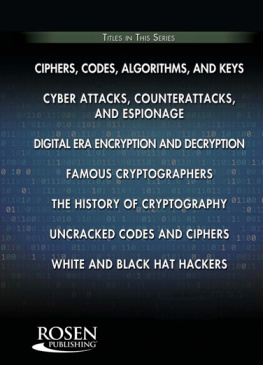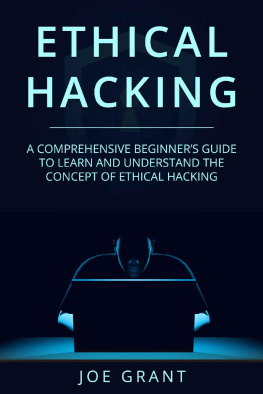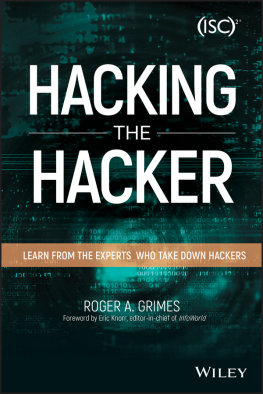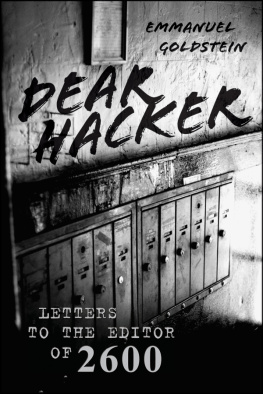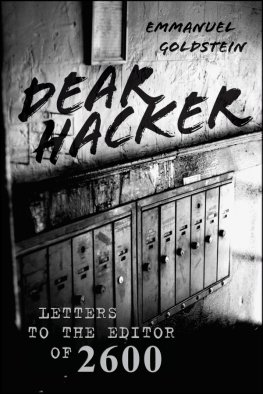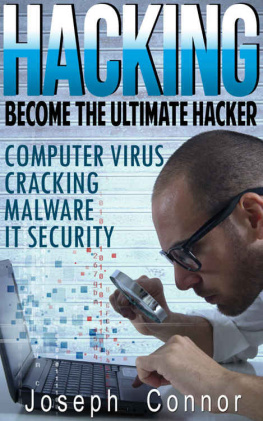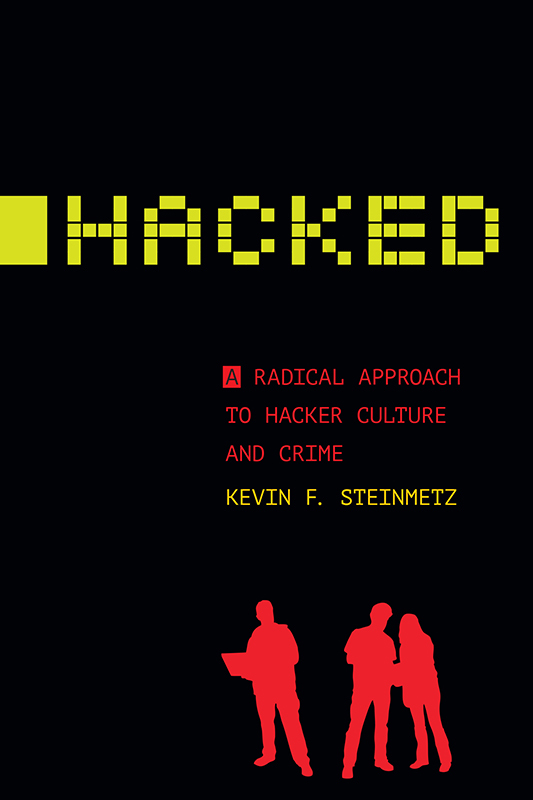
Hacked
Alternative Criminology Series
General Editor: Jeff Ferrell
Pissing on Demand: Workplace Drug Testing and the Rise of the Detox Industry
Ken Tunnell
Empire of Scrounge: Inside the Urban Underground of Dumpster Diving, Trash Picking, and Street Scavenging
Jeff Ferrell
Prison, Inc.: A Convict Exposes Life inside a Private Prison
by K.C. Carceral, edited by Thomas J. Bernard
The Terrorist Identity: Explaining the Terrorist Threat
Michael P. Arena and Bruce A. Arrigo
Terrorism as Crime: From Oklahoma City to Al-Qaeda and Beyond
Mark S. Hamm
Our Bodies, Our Crimes: The Policing of Womens Reproduction in America
Jeanne Flavin
Graffiti Lives: Beyond the Tag in New Yorks Urban Underground
Gregory J. Snyder
Crimes of Dissent: Civil Disobedience, Criminal Justice, and the Politics of Conscience
Jarret S. Lovell
The Culture of Punishment: Prison, Society, and Spectacle
Michelle Brown
Who You Claim: Performing Gang Identity in School and on the Streets
Robert Garot
5 Grams: Crack Cocaine, Rap Music, and the War on Drugs
Dimitri A. Bogazianos
Judging Addicts: Drug Courts and Coercion in the Justice System
Rebecca Tiger
Courting Kids: Inside an Experimental Youth Court
Carla J. Barrett
The Spectacular Few: Prisoner Radicalization and the Evolving Terrorist Threat
Mark S. Hamm
Comic Book Crime: Truth, Justice, and the American Way
Nickie D. Phillips and Staci Strobl
The Securitization of Society: Crime, Risk, and Social Order
Marc Schuilenburg
Covered in Ink: Tattoos, Women, and the Politics of the Body
Beverly Yuen Thompson
Narrative Criminology: Understanding Stories of Crime
Edited by Lois Presser and Sveinung Sandberg
Progressive Punishment: Job Loss, Jail Growth and the Neoliberal Logic of Carceral Expansion
Judah Schept
The Culture of Meth: Crime, Media, and the War on Drugs
Travis Linneman
Hacked: A Radical Approach to Hacker Culture and Crime
Kevin F. Steinmetz
Hacked
A Radical Approach to Hacker Culture and Crime
Kevin F. Steinmetz

NEW YORK UNIVERSITY PRESS
New York
NEW YORK UNIVERSITY PRESS
New York
www.nyupress.org
2016 by New York University
All rights reserved
References to Internet websites (URLs) were accurate at the time of writing. Neither the author nor New York University Press is responsible for URLs that may have expired or changed since the manuscript was prepared.
ISBN : 978-1-4798-6610-6 (hardback)
ISBN : 978-1-4798-6971-8 (paperback)
For Library of Congress Cataloging-in-Publication data, please contact the Library of Congress.
New York University Press books are printed on acid-free paper, and their binding materials are chosen for strength and durability. We strive to use environmentally responsible suppliers and materials to the greatest extent possible in publishing our books.
Manufactured in the United States of America
10 9 8 7 6 5 4 3 2 1
Also available as an ebook
For Pamela, who makes all things possible.
For the members of Union Hack. Thanks for the opportunity, the tutelage, and the good times.
Contents
Figure
3.1. Snowden Cardboard Cutouts
Tables
I.1. Content Analysis Sample Descriptive Statistics
1.1. Demographic and Background Characteristics
1.2. Demographic and Background Characteristics (cont.)
2.1. Components of Hacking
3.1. Perspectives on Government, Law, and Law Enforcement
A.1. Interview List
A.2. Participant Observation List
AI: artificial intelligence
ANPR: automatic number plate recognition
BASIC: Beginners All-Purpose Symbolic Instruction Code
BBS: bulletin board system
CCC: Chaos Computer Club
DMCA: Digital Millennium Copyright Act
DRM: digital rights management
CFAA: Computer Fraud and Abuse Act
CP/M: Control Program for Microcomputers
CSI: Crime Scene Investigation
DARPA: Defense Advanced Research Projects Agency
DOS: disk operating system
EFF: Electronic Frontier Foundation
F/OSS: free and open-source software
FBI: Federal Bureau of Investigation
FISA: Foreign Intelligence Surveillance Act
FUBAR: fucked up beyond all recognition
GNU: GNUs Not Unix
HBCC: Homebrew Computer Club
IBM: International Business Machines
IRC: Internet relay chat
JSTOR: Journal Storage
MIT: Massachusetts Institute of Technology
MPAA: Motion Picture Association of America
NORAD: North American Aerospace Defense Command
NSA: National Security Agency
OECD: Organization for Economic Cooperation and Development
OS: operating system
PRISM: Planning Tool for Resource Integration, Synchronization, and Management
RGB: red, green, blue
RTFM: read the fucking manual
STEM: science, technology, engineering, and mathematics
TAP: Technical Assistance Program
TMRC: Tech Model Railroad Club
UNIX: Uniplexed Information and Computing System
USA PATRIOT: United and Strengthening America by Providing Appropriate Tools Required to Intercept and Obstruct Terrorism
VoIP: Voice over Internet Protocol
This book emerged from a number of separate research projects spanning from my earliest days in graduate school to the first years of my professorial academic life. As a result, I am deeply indebted to many who have directly or indirectly shaped not only the development of my research but my trajectory as a burgeoning scholar. If the reader will indulge me, I would like to thank each of these people with the understanding that a few lines of text can do little to communicate the impact they have had. First, I have had the good fortune of having a number of mentors who have kindly directed me while tolerating or even indulging my (many) eccentricities. Thanks go to my mentors from Eastern Kentucky University (EKU), including Ken Tunnell, who taught me the meaning of academic integrity and the joys of writing. Thanks are also extended to Gary Potter, who helped challenge my perceptions of criminal justice policy and demonstrated the incendiary power of a well-timed joke. I also appreciate the efforts of Peter Kraska as he helped me develop a work ethic and a sense of rigor. In addition, I am indebted to Victor Kappeler who triggered my love of critical criminology and radical thought. It was Vic who initially encouraged me to write a booka push I can never thank him enough for.
When I left EKU for Sam Houston State University to get my Ph.D., I was met with a dizzying culture shock. Fortunately, there were people there who helped protect me from myself while giving me the support and freedom to pursue my interests. Appreciation is given to Howard Henderson. He always had time to chat and his academic openness created some of my favorite moments of scholarly collaboration. He also helped teach me the value of (critically) thinking about the potential applications of research to the real world. Dennis Longmire must also be thanked for his appreciation of philosophy and his thorough understanding of the value of human life. Last but certainly not least, I express my deepest appreciation to Jurg Gerber, who served as the chair of my doctoral dissertation and my co-author on various projects. He took me on as a student early and gave me the space to find myself as an academic. Ill also never be able to thank him enough for supporting me during the more turbulent times of my doctoral educationand for his sense of humor.
Next page

